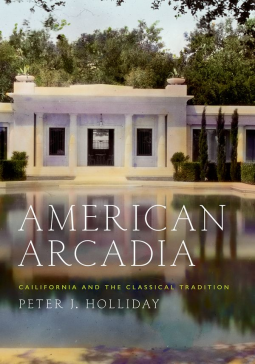
American Arcadia
California and the Classical Tradition
by Peter J. Holliday
This title was previously available on NetGalley and is now archived.
Buy on Amazon
Buy on Waterstones
*This page contains affiliate links, so we may earn a small commission when you make a purchase through links on our site at no additional cost to you.
Send NetGalley books directly to your Kindle or Kindle app
1
To read on a Kindle or Kindle app, please add kindle@netgalley.com as an approved email address to receive files in your Amazon account. Click here for step-by-step instructions.
2
Also find your Kindle email address within your Amazon account, and enter it here.
Pub Date 1 Jun 2016 | Archive Date 12 May 2016
Description
A vivid and engaging exploration of California's debt to the ancient world
Discussing the influence of the classics on America is nothing new; indeed, classical antiquity could be considered second only to Christianity as a force in modeling America's national identity. What has never been explored until now is how, from the beginning, Californians in particular chose to visually and culturally craft their new world using the rhetoric of classical antiquity.
Through a lively exploration of material culture, literature, and architecture, American Arcadia offers a tour through California's development as a Mediterranean haven from the late nineteenth century to the present. In its earliest days, California was touted as the last opportunity for alienated Yankees to establish the refined gentleman-farmer culture envisioned by Jefferson and build new cities free of the filth and corruption of those they left back East. Through architecture and landscape design Californians fashioned an Arcadian setting evocative of ancient Greece and Rome.Later, as Arcadia gave way to urban sprawl, entire city plans were drafted to conjure classical antiquity, self-styled villas dotted the hills, and utopian communities began to shape the state's social atmosphere.
Art historian Peter J. Holliday traces the classical influence primarily through the evidence of material culture, yet the book emphasizes the stories and people, famous and forgotten, behind the works, such as Florence Yoch, the renowned landscape designer and set designer for Gone with the Wind, and "Sister Aimee" Semple McPherson, the most publicized Christian evangelist of her day, whose sermons filled the Pantheon-like Angelus Temple. Telling stories from the creation of the famed aqueducts that turned the semi-arid landscape to a cornucopia of almonds, alfalfa, and oranges to the birth of the body-sculpting movement, American Arcadia offers readers a new way of seeing our past and ourselves.
Discussing the influence of the classics on America is nothing new; indeed, classical antiquity could be considered second only to Christianity as a force in modeling America's national identity. What has never been explored until now is how, from the beginning, Californians in particular chose to visually and culturally craft their new world using the rhetoric of classical antiquity.
Through a lively exploration of material culture, literature, and architecture, American Arcadia offers a tour through California's development as a Mediterranean haven from the late nineteenth century to the present. In its earliest days, California was touted as the last opportunity for alienated Yankees to establish the refined gentleman-farmer culture envisioned by Jefferson and build new cities free of the filth and corruption of those they left back East. Through architecture and landscape design Californians fashioned an Arcadian setting evocative of ancient Greece and Rome.Later, as Arcadia gave way to urban sprawl, entire city plans were drafted to conjure classical antiquity, self-styled villas dotted the hills, and utopian communities began to shape the state's social atmosphere.
Art historian Peter J. Holliday traces the classical influence primarily through the evidence of material culture, yet the book emphasizes the stories and people, famous and forgotten, behind the works, such as Florence Yoch, the renowned landscape designer and set designer for Gone with the Wind, and "Sister Aimee" Semple McPherson, the most publicized Christian evangelist of her day, whose sermons filled the Pantheon-like Angelus Temple. Telling stories from the creation of the famed aqueducts that turned the semi-arid landscape to a cornucopia of almonds, alfalfa, and oranges to the birth of the body-sculpting movement, American Arcadia offers readers a new way of seeing our past and ourselves.
Available Editions
| EDITION | Hardcover |
| ISBN | 9780190256517 |
| PRICE | US$45.00 (USD) |



